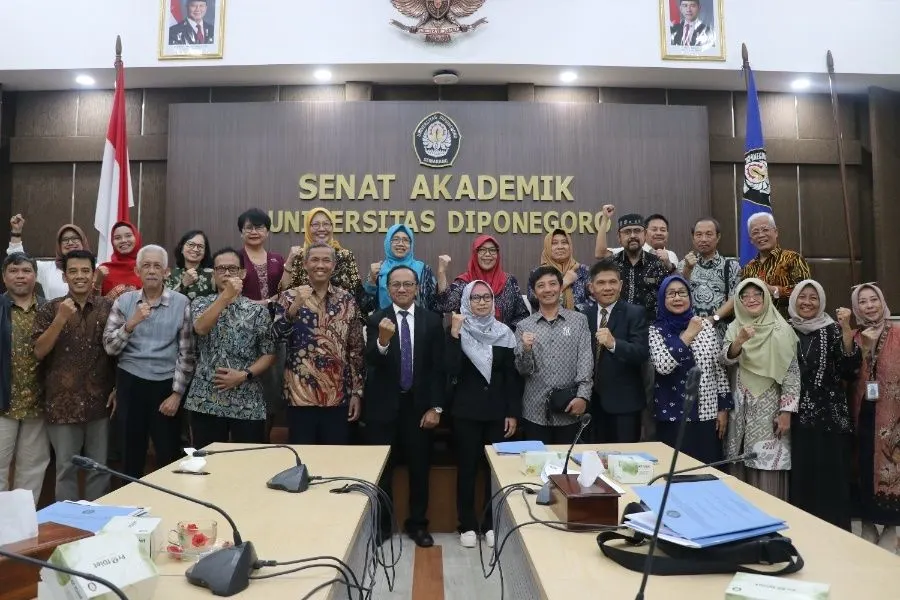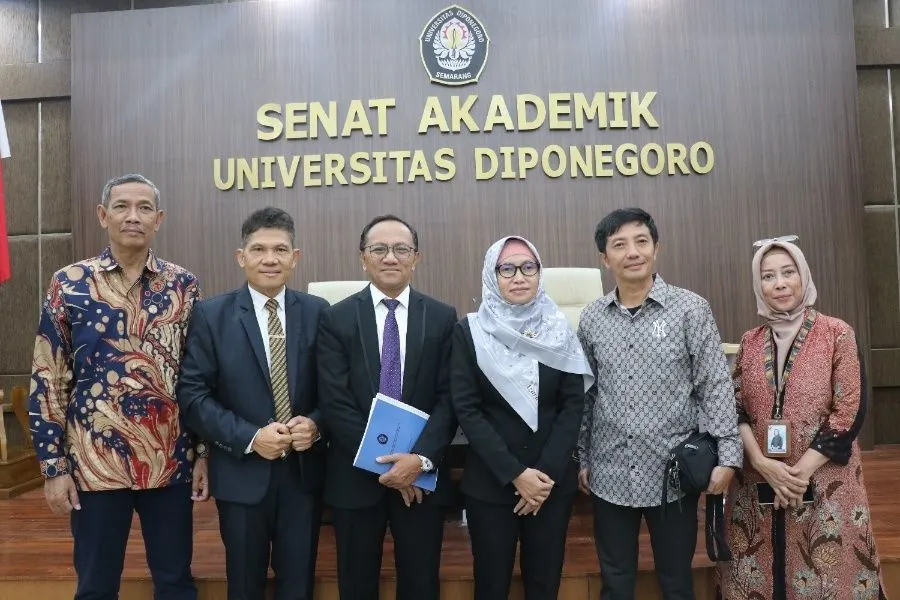UNDIP, Semarang (June 28, 2025) – Universitas Diponegoro’s Faculty of Engineering continues to make significant strides in the advancement of science and its real-world contributions to society. Two of its distinguished lecturers, Dr. Diana Puspita Sari, S.T., M.T. from the Department of Industrial Engineering, and Dr. Ir. Purwanto, M.T., M.Eng. from the Department of Civil Engineering, delivered scholarly presentations at the Plenary Session for Prospective Professors hosted by the UNDIP’s Board of Professors on Thursday, June 26, 2025, at the Academic Senate Room, 3rd Floor, SA-MWA Building, UNDIP Tembalang Campus.
This event marked a significant milestone in their pursuit of the university’s highest academic ranking. Demonstrating a deep academic commitment and enthusiasm, both candidates presented innovative research that addresses real-world challenges in environmental and structural resilience.
The session was opened by Prof. Denny Nugroho Sugianto, S.T., M.Si., Secretary of the UNDIP’s Board of Professors, and chaired by Prof. Dr. Ir. Purwanto, DEA, the Chair of the Board. In his introduction, Prof. Denny outlined the expertise of each candidate—Dr. Diana is a scholar in sustainable supply chains, and Dr. Purwanto is in green concrete.
Dr. Diana’s presentation, titled “Waste Management in Sustainable Supply Chains: A New Direction for Responsible Consumption and Production Based on Circular Economy,” focused on how waste—from households and agriculture to industrial sources—can be systematically transformed into valuable resources through circular economy principles and sustainable supply chain innovation.
Her research proposes a comprehensive and phased roadmap for waste management across various sectors, including e-waste, domestic waste, agricultural waste, and furniture waste. Approaches such as 3R (Reduce, Reuse, Recycle), eco-design, reverse logistics, eco-efficiency assessments, and tools like SimaPro for environmental impact analysis were highlighted.
“Waste management can no longer be viewed merely as disposal. It is an opportunity to build a green economy that creates jobs, preserves ecosystems, and strengthens the competitiveness of local industries,” she emphasized.
Dr. Diana’s findings also revealed that converting waste into eco-friendly furniture materials results in promising ecological efficiency indices. However, challenges such as organizational resistance, limited data, and technological gaps must still be addressed across sectors.
Meanwhile, Dr. Ir. Purwanto, M.T., M.Eng. presented his research titled “Application of SCGC Haunch Eco-Friendly Concrete for Structural Beam Strengthening.” His work explores the use of FABA waste (Fly Ash and Bottom Ash) to produce Self-Compacting Geopolymer Concrete (SCGC) as a sustainable and earthquake-resistant alternative to conventional concrete.
Laboratory tests showed that SCGC can increase the capacity and ductility of structural beams by up to 1.73 times compared to traditional concrete. Beyond strength, this material also significantly reduces CO₂ emissions and is highly resistant to aggressive environments such as coastal or marine areas.
“Geopolymer concrete not only addresses the structural strength and durability challenges but also offers a concrete solution for managing industrial waste and providing long-lasting reinforcement for buildings in earthquake-prone regions like Indonesia. It is a forward-looking solution for sustainable construction,” he said.
Dr. Purwanto also emphasized the importance of promoting eco-friendly concrete to stakeholders, enabling broader adoption in national infrastructure development.
These presentations highlight UNDIP’s growing emphasis on sustainable development and green technology-based solutions, aligning with its mission to deliver academic excellence that addresses contemporary global challenges. The UNDIP’s Board of Professors welcomed the valuable contributions presented by the two prospective professors and expressed hope that their innovations would bring broad benefits to the nation and beyond. (Public Communication/ UNDIP/ DHW)











